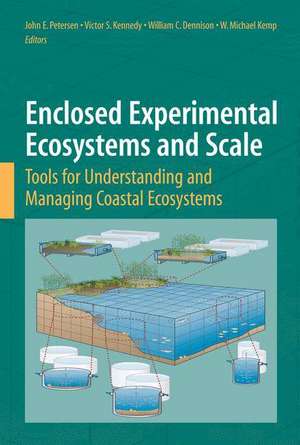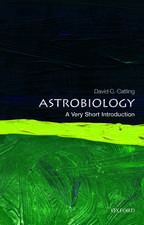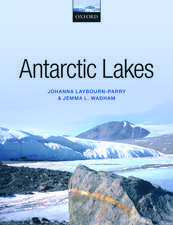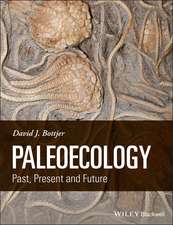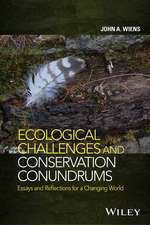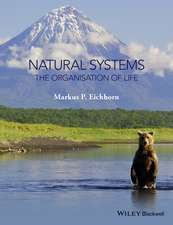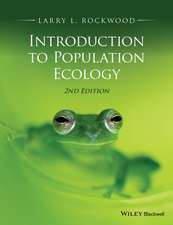Enclosed Experimental Ecosystems and Scale: Tools for Understanding and Managing Coastal Ecosystems
Editat de John E. Petersen, Victor S. Kennedy, William C. Dennison, W. Michael Kempen Limba Engleză Hardback – 27 feb 2009
Enclosed Experimental Ecosystems and Scale: Tools for Understanding and Managing Coastal Ecosystems provides scientists, managers, and policy makers with an introduction to what has been termed the "problem of scale", and presents information that will allow for improved design and interpretation of enclosed experimental aquatic ecosystems. The book integrates the results of a 10-year research project involving a multi-disciplinary team of scientists and students to explore scale-related questions in a variety of coastal habitats. Anticipating use as a reference, the book has been designed so that individual sections and individual pages can function as stand alone units.
| Toate formatele și edițiile | Preț | Express |
|---|---|---|
| Paperback (1) | 390.63 lei 3-5 săpt. | |
| Springer – 27 feb 2009 | 390.63 lei 3-5 săpt. | |
| Hardback (1) | 398.35 lei 6-8 săpt. | |
| Springer – 27 feb 2009 | 398.35 lei 6-8 săpt. |
Preț: 398.35 lei
Nou
Puncte Express: 598
Preț estimativ în valută:
76.23€ • 82.78$ • 64.04£
76.23€ • 82.78$ • 64.04£
Carte tipărită la comandă
Livrare economică 22 aprilie-06 mai
Preluare comenzi: 021 569.72.76
Specificații
ISBN-13: 9780387767666
ISBN-10: 0387767665
Pagini: 221
Ilustrații: X, 222 p. 400 illus., 152 illus. in color.
Dimensiuni: 178 x 254 x 15 mm
Greutate: 0.66 kg
Ediția:2009
Editura: Springer
Colecția Springer
Locul publicării:New York, NY, United States
ISBN-10: 0387767665
Pagini: 221
Ilustrații: X, 222 p. 400 illus., 152 illus. in color.
Dimensiuni: 178 x 254 x 15 mm
Greutate: 0.66 kg
Ediția:2009
Editura: Springer
Colecția Springer
Locul publicării:New York, NY, United States
Public țintă
ResearchCuprins
Preface.- Introduction and Background: Coastal ecosystems, management, and research.- Concepts of scale in ecology.- Mesocosms and scaling patterns.- Using mesocosms to study the effects of scale.- Designing Experimental Ecosystem Studies: General principles.- Temporal and spatial scaling.- Mixing and flow.- Materials exchange.- Light.- Walls.- Temperature.- Physical and biological complexity.- Aquatic grasses.- Marshes.- Sediments.- Chemistry.- Tools for Design and Analysis of Experiments: The world is variable.- Dimensional analysis.- Modeling tools.- Applications: Benthic organisms.- Nutrient enrichment and trophic efficiency.- Aquatic grasses, nutrients, and suspended sediments.- Index.
Recenzii
From the reviews:
"This gem of a book deals with both experimentation and theory as applied to the ecology of coastal systems, covering broad scales of space, time, and complexity. … The work’s prose is succinct and clear, and the figures are abundant and beautifully rendered with lots of color. This comprehensive, practical guide will be valuable to students and researchers who are studying or managing coastal ecosystems. Summing Up: Highly recommended. Upper-division undergraduate through professional collections." (P. R. Pinet, Choice, Vol. 47 (1), September, 2009)
“It provides a nice practical guide for mesocosm users, and would thus be a worth-while purchase for ecologists planning mesocosm experiments, especially in temperate coastal systems. … offers plenty of material to interest even the most seasoned mesocosm user. … The use of nontechnical language, lucid illustrations, and a summary style render the volume imminently readable for levels ranging from keen undergraduates planning to honors project to experienced professional ecologists.” (John N. Griffin and Brian R. Silliman, The Quarterly Review of Biology, Vol. 85 (3), September, 2010)
"This gem of a book deals with both experimentation and theory as applied to the ecology of coastal systems, covering broad scales of space, time, and complexity. … The work’s prose is succinct and clear, and the figures are abundant and beautifully rendered with lots of color. This comprehensive, practical guide will be valuable to students and researchers who are studying or managing coastal ecosystems. Summing Up: Highly recommended. Upper-division undergraduate through professional collections." (P. R. Pinet, Choice, Vol. 47 (1), September, 2009)
“It provides a nice practical guide for mesocosm users, and would thus be a worth-while purchase for ecologists planning mesocosm experiments, especially in temperate coastal systems. … offers plenty of material to interest even the most seasoned mesocosm user. … The use of nontechnical language, lucid illustrations, and a summary style render the volume imminently readable for levels ranging from keen undergraduates planning to honors project to experienced professional ecologists.” (John N. Griffin and Brian R. Silliman, The Quarterly Review of Biology, Vol. 85 (3), September, 2010)
Textul de pe ultima copertă
The environmental challenges now facing humanity, ranging from climate change to urbanization to invasive species to agricultural and industrial pollutants are particularly acute in the coastal zone. Research in this region and in other aquatic ecosystems is complicated by interactions that occur over broad scales of time, space, and ecological complexity. Enclosed experimental ecosystems (mesocosms and microcosms) have become critical research tools because they provide a degree of control not achievable through field experiments. Yet to date, techniques for systematically extrapolating results from small-scale experimental ecosystems to larger, more open, more biodiverse, and more heterogeneous ecosystems in nature have not been well developed. This book is designed to provide scientists, resource managers and students with a comprehensive and practical guide and reference for improving the design and interpretation of research conducted in experimental ecosystems.
Caracteristici
Stand-alone pages are designed for quick and easy reference Color illustrations throughout A unique reference for those who work with experimental ecosystems
